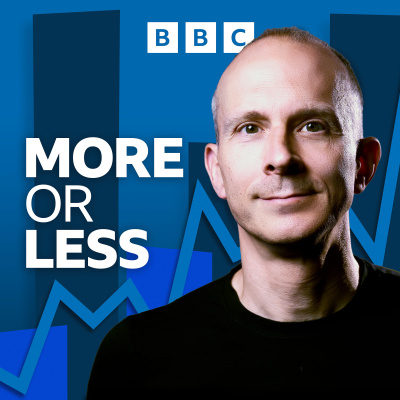Synopsis
Tim Harford and the More or Less team try to make sense of the statistics which surround us. From BBC Radio 4
Episodes
-
Drinks and drugs capital of the world? (WS)
06/07/2012 Duration: 09minDo residents of the tiny micronesian island of Palau really smoke more cannabis, and drink more beer, than anyone else?
-
Hit movies and killer birthdays (WS)
29/06/2012 Duration: 09minWhat is the highest-earning film ever if you adjust for inflation? And are birthdays killing us?
-
(WS) Weight of the world
23/06/2012 Duration: 09minHow fat could the global population become? Plus, Angela Saini considers whether statistics could settle the disputed result of the world title fight between boxers Manny Pacquiao and Timothy Bradley. This programme was first broadcast on the BBC World Service.
-
(WS) Chance encounters
18/06/2012 Duration: 09minIs the likelihood of bumping into your boss on holiday greater than you think? Angela Saini and the More or Less team assess the probabilities of some of life's great coincidences. This edition of More or Less was first broadcast on the BBC World Service.
-
Interview with Daniel Kahneman
11/06/2012 Duration: 09minTim Harford interviews Daniel Kahneman, a psychologist who won the Nobel Prize in Economics. The author of Thinking, Fast and Slow describes the common mistakes people make with statistics.
-
Counting images of The Queen. (WS)
04/06/2012 Duration: 09minHow many images of Queen Elizabeth II have ever been created? And is Facebook really worth more than twice as much as every company on the Nigerian Stock Exchange?
-
Would firing staff 'at will' work? (R4)
28/05/2012 Duration: 24minIs there any evidence to support the Beecroft Review's recommended changes to employment law? Plus: hard-working Greeks, infidelity, and Ben Goldacre on publication bias.
-
The maths of infidelity (WS)
25/05/2012 Duration: 09minIt’s a very commonly-held belief that men are less faithful than women But it takes two to tango. So can this be mathematically possible? And we answer a cry for help from an Australian listener who wants to be “a bit more average”.
-
Where are the world hardest workers? (WS)
21/05/2012 Duration: 09minEarlier in the year we found out that Greeks put in more working hours than Germans. But the Germans are more efficient. So that got us thinking: who works the longest hours in the world?
-
Troubled families and unneutered cats. (R4)
17/05/2012 Duration: 27minTroubled families, nursing numbers and the mathematical consequences of unneutered cats.
-
Trouble on the Greek railways (WS)
14/05/2012 Duration: 09minWould it be cheaper to send every Greek rail passenger by taxi instead? This programme was first broadcast on the BBC World Service.
-
Are CEOs worth it? (R4)
11/05/2012 Duration: 28minExecutive pay, chess and trouble on the Greek railway.
-
A grand economic experiment? (WS)
04/05/2012 Duration: 09minAre we witnessing a grand economic experiment being played out between Europe, trying to cut its way out of trouble, and the United States, trying to spend its way to redemption? Plus, we investigate the height of North Koreans. This programme was first broadcast on the BBC World Service.
-
Austerity, border queues and bank holidays (R4)
04/05/2012 Duration: 27minAre we witnessing a grand economic experiment playing out between Britain and the United States? How long have travellers been waiting to get through immigration at Heathrow? Plus, are you going to destroy the economy this bank holiday weekend?
-
The formula that changed the world
27/04/2012 Duration: 09minThe Midas Formula - In this week's More or Less: The story of Black-Scholes, the equation that transformed Wall Street – and the arguments over whether it made the world a better place, or helped cause the financial mess we have all been dealing with for the past five years. This programme was first broadcast on the BBC World Service.
-
The formula that changed the world
27/04/2012 Duration: 28minRain and drought in numbers, the formula which changed Wall Street and then the world forever - and why Conservative MPs used to be taller than their Labour counterparts.
-
Eurostats - True or False?
13/04/2012 Duration: 09minAre there really more Porsche Cayenne owners in Greece than taxpayers earning over 50,000 euros? Can there really be 30,000 chauffeur driven cars for the exclusive use of Italian politicians? Would it really be cheaper to send everyone by taxi than train in Greece and is youth unemployment in Spain really 50%? Ruth Alexander and Wesley Stephenson take a very close look at some widely reported Eurostats to see whether they stand up to scrutiny for out this week's More or Less. This programme was first broadcast on the BBC World Service.
-
Stamp prices and the first maths book
06/04/2012 Duration: 09minThe Royal Mail says UK stamp prices are still among the best value in Europe, despite an imminent steep price rise. Tim Harford finds out whether this is true, and compares the price of postal services around the world. Plus, he finds out how, after being invented by Indian mathematicians, modern numbers became established in the ancient Arab world and then journeyed on to Europe in what was essentially the first maths textbook ever written, "Liber Abaci". Its author was Leonardo of Pisa, better known as Fibonacci. Tim speaks to Keith Devlin, author of The Man of Numbers, to find out more. This programme was first broadcast on the BBC World Service.
































